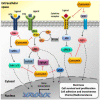The Multi-Faceted Effect of Curcumin in Glioblastoma from Rescuing Cell Clearance to Autophagy-Independent Effects
- PMID: 33092261
- PMCID: PMC7587955
- DOI: 10.3390/molecules25204839
The Multi-Faceted Effect of Curcumin in Glioblastoma from Rescuing Cell Clearance to Autophagy-Independent Effects
Abstract
The present review focuses on the multi-faceted effects of curcumin on the neurobiology glioblastoma multiforme (GBM), with a special emphasis on autophagy (ATG)-dependent molecular pathways activated by such a natural polyphenol. This is consistent with the effects of curcumin in a variety of experimental models of neurodegeneration, where the molecular events partially overlap with GBM. In fact, curcumin broadly affects various signaling pathways, which are similarly affected in cell degeneration and cell differentiation. The antitumoral effects of curcumin include growth inhibition, cell cycle arrest, anti-migration and anti-invasion, as well as chemo- and radio-sensitizing activity. Remarkably, most of these effects rely on mammalian target of rapamycin (mTOR)-dependent ATG induction. In addition, curcumin targets undifferentiated and highly tumorigenic GBM cancer stem cells (GSCs). When rescuing ATG with curcumin, the tumorigenic feature of GSCs is suppressed, thus counteracting GBM establishment and growth. It is noteworthy that targeting GSCs may also help overcome therapeutic resistance and reduce tumor relapse, which may lead to a significant improvement of GBM prognosis. The present review focuses on the multi-faceted effects of curcumin on GBM neurobiology, which represents an extension to its neuroprotective efficacy.
Keywords: anti-cancer effects; autophagy; curcuma longa; glioblastoma stem-like cells; natural polyphenols; neuroprotection.
Conflict of interest statement
The authors declare no conflict of interest.
Figures


Similar articles
-
A curcumin derivative hydrazinobenzoylcurcumin suppresses stem-like features of glioblastoma cells by targeting Ca2+ /calmodulin-dependent protein kinase II.J Cell Biochem. 2019 Apr;120(4):6741-6752. doi: 10.1002/jcb.27972. Epub 2018 Nov 2. J Cell Biochem. 2019. PMID: 30390339
-
CXCR4 antagonism sensitizes cancer cells to novel indole-based MDM2/4 inhibitors in glioblastoma multiforme.Eur J Pharmacol. 2021 Apr 15;897:173936. doi: 10.1016/j.ejphar.2021.173936. Epub 2021 Feb 10. Eur J Pharmacol. 2021. PMID: 33581134
-
Curcumin promotes differentiation of glioma-initiating cells by inducing autophagy.Cancer Sci. 2012 Apr;103(4):684-90. doi: 10.1111/j.1349-7006.2011.02198.x. Epub 2012 Jan 30. Cancer Sci. 2012. PMID: 22192169 Free PMC article.
-
The Autophagy Status of Cancer Stem Cells in Gliobastoma Multiforme: From Cancer Promotion to Therapeutic Strategies.Int J Mol Sci. 2019 Aug 5;20(15):3824. doi: 10.3390/ijms20153824. Int J Mol Sci. 2019. PMID: 31387280 Free PMC article. Review.
-
Anti-tumor Effects of Curcuminoids in Glioblastoma Multiforme: An Updated Literature Review.Curr Med Chem. 2021;28(39):8116-8138. doi: 10.2174/0929867327666201111145212. Curr Med Chem. 2021. PMID: 33176632 Review.
Cited by
-
The Role of Curcumin in Cancer: A Focus on the PI3K/Akt Pathway.Cancers (Basel). 2024 Apr 18;16(8):1554. doi: 10.3390/cancers16081554. Cancers (Basel). 2024. PMID: 38672636 Free PMC article. Review.
-
Autophagy Modulation and Its Implications on Glioblastoma Treatment.Curr Issues Mol Biol. 2023 Oct 29;45(11):8687-8703. doi: 10.3390/cimb45110546. Curr Issues Mol Biol. 2023. PMID: 37998723 Free PMC article. Review.
-
Natural Compounds as Promising Adjuvant Agents in The Treatment of Gliomas.Int J Mol Sci. 2022 Mar 20;23(6):3360. doi: 10.3390/ijms23063360. Int J Mol Sci. 2022. PMID: 35328780 Free PMC article. Review.
-
Autophagy Activation Promoted by Pulses of Light and Phytochemicals Counteracting Oxidative Stress during Age-Related Macular Degeneration.Antioxidants (Basel). 2023 May 30;12(6):1183. doi: 10.3390/antiox12061183. Antioxidants (Basel). 2023. PMID: 37371913 Free PMC article. Review.
-
Swimming training and herbal nanoformulations as natural remedies to improve sensory-motor impairment in rat midbrain tumor models: system biology, behavioral test, and experimental validation.3 Biotech. 2023 May;13(5):149. doi: 10.1007/s13205-023-03574-3. Epub 2023 Apr 29. 3 Biotech. 2023. PMID: 37131964 Free PMC article.
References
-
- Prasad S., Aggarwal B.B. Turmeric, the Golden Spice: From Traditional Medicine to Modern Medicine. In: Benzie I.F.F., Wachtel-Galor S., editors. Herbal Medicine: Biomolecular and Clinical Aspects. 2nd ed. CRC Press/Taylor & Francis; Boca Raton, FL, USA: 2011. - PubMed
-
- Aggarwal B.B., Sundaram C., Malani N., Ichikawa H. Curcumin: The Indian solid gold. Adv. Exp. Med. Biol. 2007;595:1–75. - PubMed
-
- Miriyala S., Panchatcharam M., Rengarajulu P. Cardioprotective effects of curcumin. Adv. Exp. Med. Biol. 2007;595:359–377. - PubMed
Publication types
MeSH terms
Substances
Grants and funding
LinkOut - more resources
Full Text Sources
Miscellaneous

